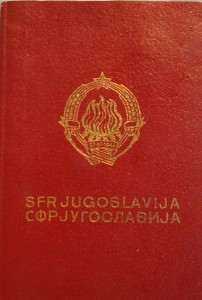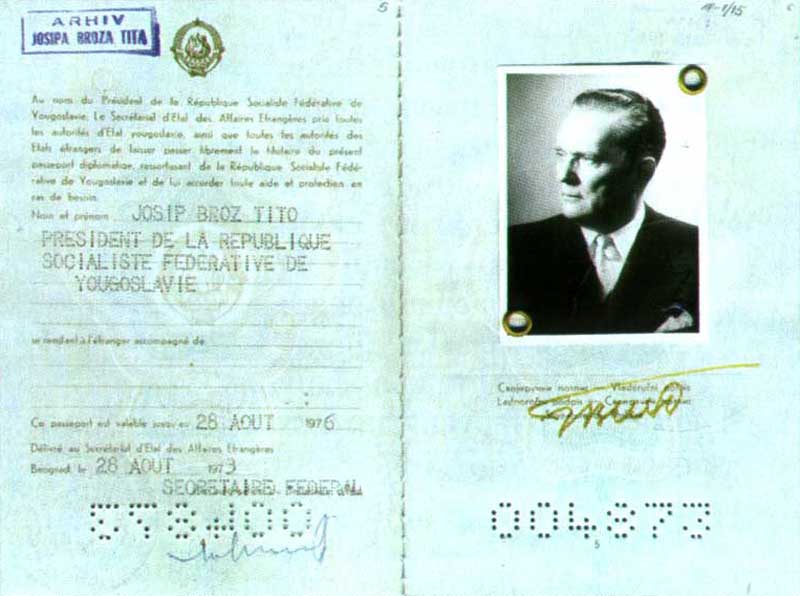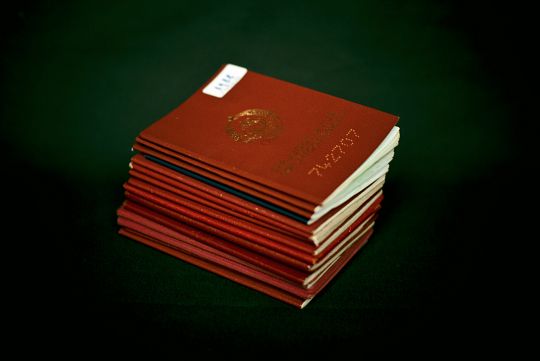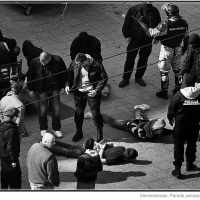Once upon a time, the Yugoslav passport was a highly sought-after commodity. However, after the dissolution of the socialist federation, things got a bit complicated
(via Citizenship in Southeast Europe)
During a summer dawn in 2005, our šinobus, the small local train from Subotica (in Serbia) to Szeged (in Hungary) suffered engine failure in a village just south of the new EU-funded €10m high-tech Hungarian-Serbian border post. While the machinist attempted to repair the vehicle, with plentiful ‘advice’ from the station master, a policeman and a border guard ready to travel to work, I chatted to a newly embarked passenger. Maja K, a teacher of about forty-five, had married into this predominantly Hungarian-inhabited village. She was going to visit her daughter, who studied in Budapest.
Our conversation continued on the train from Szeged to Budapest, but the tone was set while we were still stuck at the station. The border guard asked the policeman, in Hungarian-accented Serbian: ‘Do you know what we call a visa?’ He didn’t. ‘Porez za budale,’ the border guard replied [‘Tax for idiots’]. Picking up the theme, Maja K lamented the humiliating treatment (as ‘an idiot’) she experienced whenever she wanted to visit her daughter. Expressing dismay at the passport she carried, containing a visa ready for inspection, she compared her current entrapment to a past life marked by mobility, lyrically recalling the ‘red’ passport of the Socialist Federative Republic of Yugoslavia (SFRY).
The passport that Maja K carried—the blue one of the Federal Republic of Yugoslavia (FRY), a state that had ceased to exist two years earlier—allowed visa-free travel to only about one tenth of the world’s two hundred states. While movement between post-Yugoslav states (except Slovenia, which had joined the EU) had recently become somewhat easier for her, Maja K’s overall entrapment had intensified as the Hungarian, Bulgarian and Romanian governments withdrew visa-free entry as part of their EU accession processes. Likewise, over the last decade, holders of Bosnian-Herzegovinian passports had lost some of their few options for visa-free travel, such as Romania and also Italy.
I thus conducted much of my ethnographic research in Serbia and in Bosnia and Herzegovina (BiH) during a period of maximum entrapment—between 1996 and the inclusion of Serbian (2009) and BiH (2010) passports in the so-called ‘White Schengen’ list. Throughout this period, the default immobilisation of holders of those post-Yugoslav passports could only be suspended individually and temporarily—through obtaining a visa.
Like Maja K, many other people—particularly the middle-aged and elderly—tended to juxtapose this situation with their previous visa-free mobility, attributing an iconic place to the red passport. This passport, I was told, was the most frequently stolen and falsified passport in the world, and the most expensive one on the black market (‘up to DM 10,000’). Exaggerations and poetic licence aside, references to the red passport as a document that had allowed smooth cross-border travel were not simply nostalgic idealisations.
For a certain period, SFRY citizens really had topped the global hierarchy of mobility. As part of its non-aligned policies, and in order to cope with domestic unemployment, the Yugoslav government signed scores of mutual agreements on visa-free entry from the mid-1960s. Eventually this applied to most states on the globe, excluding, for example, the USA, Albania, China, Israel and Greece, but including over a hundred Non-Aligned states and almost all European states in both the Eastern and Western blocs.
During the latter phase of the Cold War, the Yugoslav passport thus allowed wider and smoother cross-border mobility than any other passport I know of. Eventually, perhaps half of Yugoslavia’s adult population had passports, and could, in principle, travel visa-free to almost all of Europe and well beyond. And they did so in large numbers, whether as tourists, gastarbajteri (guest workers) or shoppers. In 1976, for example, 16 million border crossings by Yugoslavs were counted in this country of some 20 million inhabitants.
Two decades later I encountered an intense preoccupation with travel documents in BiH and Serbia. Let me disentangle a number of layers in the popular discourse that, like Maja K’s, juxtaposed current entrapment with past mobility.
Firstly, people lamented visa queues and bureaucratic procedures because, for most, they involved multiple day-long expeditions that could cost the best part of an average monthly wage. The red SFRY passport then appeared as the opposite, recalling cheap and carefree cross border mobility.
The anger directed at visa requirements, however, did not merely target the practical obstacles represented by consular procedures. Many saw the logistics of visa application as a form of humiliation: the discomfort of the queues, the cumbersome procedures, the intimidating infrastructure, the bullying by embassy personnel, the refusal to account for decisions—all this was widely interpreted as maltretiranje, as malicious mistreatment. Again, the red passport, allowing broad visa-free travel, served as the idealised counterpart. According to an oft-repeated story, spiced up with generalisation: ‘Border guards saw your red passport and simply waved you through’.
Yet, the fondness with which people recalled the red passport seemed independent of the frequency of their actual cross-border travel. Far beyond consular procedures, there was a sense that belonging to a collective of citizens subject to visa regimes was itself humiliating. Visa requirements and the SFRY passport thus formed a particularly effective pair of contrasts to articulate a broad sense of loss of dignity and recognition.This dynamic is at the centre of the remainder of this text.
How did travel documents come to play this role? Derived from the French, ‘passeport’ originally denoted the authorisation to pass through a port. In the Middle Ages some authorities issued single-purpose ‘passport letters’ to foreigners to grant them safe passage through their territory. Especially after WWI, state authorities began to issue passports to their own citizens and to systematically monitor border-crossing movements.
Modern passports are thus state-issued documents that allow individuals to leave that state and—often conditional on other documents, such as visas—to enter another. Over time the spread and standardisation of such documents has grown central to a globalised regime of mobility. Passports classify individuals into collectivities that function as ‘mobility strata’: the collectivity to which you belong determines the particular degree of smooth cross-border mobility you are awarded. This stratified regulation of cross-border mobility has been reshuffled considerably since the early 1990s, exactly when the red passport was left without its state.
Amongst broad layers of the populations in BiH and Serbia, I found over the years, the SFRY passport allowed people to articulate resentment of their current entrapment in terms of their own past, both remembered and misremembered. Notwithstanding its uniqueness on a global stage, they asserted an entitlement to smooth visa-free mobility like the one they had lost.
The red passport allowed everyone who was old enough, regardless of how much they had actually travelled, to say that they could have. ‘Normal lives’ in Yugoslavia, then, were not only recalled in terms of living standards, order and welfare, but also of what we could call a sense of geopolitical dignity. Here, the red passport joined forces with Tito.
Like Maja K, many people told me anecdotes about travel abroad in which their hosts expressed admiration for Yugoslavia and its President. Their own positive memories of Tito often concurred that, for all his faults, he had put them on the map. Again, this statement draws its significance from retrospective contrast: after 1991, of course, Bosnia-Herzegovina and Serbia were also on the map, but for all the wrong reasons.
Red passport recollections thus channelled a sense of one’s relative ranking in a hierarchy of collectivities, a ‘place in the world’. Movement was crucial. It was not simply that people felt that some collectivities (say, ‘the Swedes’) occupied a static superior place to themselves. There was also a sense that some were ‘advanced’ or ‘behind’ in a process of ongoing movement: that some collectivities (say, ‘the Czechs’) were moving at a better rate than they were.
A particular position was reserved for citizens of other East European states. Many people in BiH and in Serbia bitterly pointed out to me that, with their red passport, they had been able to travel more freely than even Western Europeans, whereas today they were more entrapped than even most Eastern Europeans.
Entrapment by EU visa regimes was thus experienced by many as a humiliating inversion of European geopolitical hierarchies: excluded from the EU, they were reduced to having to catch upwith those Eastern Europeans who, it was noted with a characteristic Yugoslav sense of superiority, had previously not even been able to dream of the mobility allowed by a SFRY passport. Shockingly, with EU enlargement one now ‘even’ needed visas to visit those Eastern European states. ‘Before…’, Maja K said, pointing through the window as our train rode through Hungary in 2005, ‘To them we were the West!’
This post-Yugoslav sense of humiliation through entrapment, I suggest, sharply exposes the multilayered workings of Eurocentrism. If citizens of BiH and of Serbia considered themselves victims of Western Eurocentric Balkanism, many of them replicated this kind of exclusionary attitude towards Others.
 When citizens of Romania and Bulgaria were first allowed to use the visa-free EU-lane at airports, and then to join the EU, some met this with ridicule and disbelief. Europe overwhelmingly remained the self-evident point of reference for any assessment of one’s ‘place in the world’.
When citizens of Romania and Bulgaria were first allowed to use the visa-free EU-lane at airports, and then to join the EU, some met this with ridicule and disbelief. Europe overwhelmingly remained the self-evident point of reference for any assessment of one’s ‘place in the world’.
Almost nobody compared EU visa restrictions for BiH or Serbian passport holders to that of people from, say, Asia or Africa.
And if anyone did, it was often precisely to prove the point of humiliation. Some expressed exasperation at being ‘in the same newspaper reports with Rwanda,’ and others made rueful comments to me about having become the object of anthropological research, a discipline considered to be about ‘primitive tribes’.
In a post-Cold War context where capitalist liberal democracy was projected as the only possible route of development, this resonated with the Eurocentrism so central to the EU-project itself. The relentless calls by EU politicians that ‘BiH and Serbia prove their commitment to Europe’ implied that they distance themselves from non-Europeans who might or might not share some of their predicaments.
At every step on the ‘road to Europe’—built around the progressive fulfilment of conditions and a presumably known destination—EU officials exhorted local politicians to raise the outer European fence in order to be allowed within it. Conditions included biometric passports, readmission of citizens forcibly returned from the EU and measures against trafficking and ‘illegal’ immigration. Visa relaxations, and closer links with the EU, were thus conditional on tightening one’s own border controls, except of course those towards the EU, whose citizens always travelled visa-free into BiH and, since 2003, into Serbia too. Having a ‘place in the world’, clearly, implied knowing your place.
The Yugoslav lands, lest we forget, have the historical experience not of colonizers but of colonies, having been parts of the Ottoman and Austro-Hungarian empires. Moreover, through the Non-Aligned Movement, they have been central to a non-Eurocentric, anti-imperialist global alliance. Yet that engagement is part of the region’s socialist history, which has been declared illegitimate as a foundation for its future by both local and EU elites. When anti-Eurocentrism might be a luxury that those on its margins can only afford at the price of their own exclusion, in this geopolitical moment Eurocentrism is the channel through which they can prove their European-ness in terms acceptable to the EU.
Let us be clear then: what was resented by many citizens of BiH and of Serbia was not so much that a global hierarchy of mobility existed, allowing some people to move smoothly across borders and treating others as entrapped ‘idiots’. Above all, they resented that it was they, of all people, who were condemned to the category of ‘idiots’. This damning indication of their collective ‘place in the world’ sharpened in the face of recollections that, not long ago, they had not occupied the ‘idiot’ slot. Quite to the contrary, red passport in hand, they had travelled smoothly and with dignity.
More generally, the resentment at being misplaced in the new, post-Cold War rankings of mobility harshly reflected a tension in the current historical conjuncture. On the one hand, globalising neoliberalism—and EU enlargement as part of it—projects self-understandings of mobility as morally and economically desirable. If we are to believe the advertisements, we are all travellers.
Yet on the other hand there is nothing like a right to cross-border mobility. It is on the crossroads of such projections of mobility and increasingly hierarchically regulated border regimes that globalising neoliberalism produces immobilized ‘idiots’.
Let me end with a provocative question. If and when BiH and Serbia join the Schengen zone—or some successor of it—what will be the legacy of the furious resentment of the first two post-Yugoslav decades? Will their citizens prove to be exemplary Europeans, approaching migration matters with selfishness and inhospitality? Or will there be a hopeful residue of the anger? As rows of other people, seeking to travel to Europe, are being treated as ‘idiots’ in the queues under the EU flags in front of some BiH or Serbian embassy, will anyone be able to turn the memory of their own humiliation into a source of solidarity?
*The Europeanisation of Citizenship in the Successor States of the Former Yugoslavia (CITSEE) is a study of the citizenship regimes of the seven successor states of the former Yugoslavia (Bosnia-Herzegovina, Croatia, Kosovo, Macedonia, Montenegro, Serbia, Slovenia). It is funded by an Advanced Investigator Award for basic research made to Jo Shaw by the European Research Council and runs for five years from 1 April 2009.

















